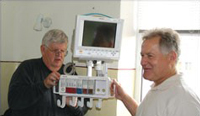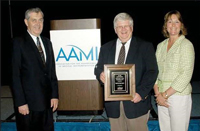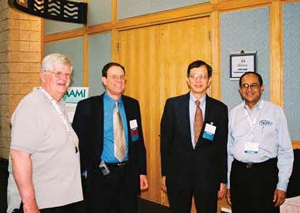- Membership
- In Memoriam
- Leslie Robert Atles
- Mario Castañeda
- David P. Harrington, PhD
- John Daniel Hughes, Jr.
- Al Grazutis Jakniunas
- George I. Johnston
- Robert L. Morris, PE, CCE
- Joel J. Nobel, MD
- Thomas Joseph O'Dea, PhD, CCE
- Marvin Dale Shepherd, PE, FACCE
- David A. Simmons, ScD, P.E., FACCE, CCE, CQE
|
|
|
|
Our Tribute to One of ACCE's Founders and Humanitarian
David P. Harrington, PhD
August 22, 1941 – September 27, 2018
Engineer, Humanitarian, Writer, Mentor
“Let’s get out there and make things work, we need to do better!” Dave Harrington
I am very sorry to report to the members the passing away of our founding member David Harrington recently. As for many in the Clinical Engineering, Dave had been my mentor and very generous friend and colleague. He helped me in so many ways in my professional career. For many years, Dave and I alternatively (every other month) wrote articles in 24x7 magazine on CBET and CCE Preparation topics. Dave was a prolific writer and had been writing for 24x7 magazine for a very long period of time. He encouraged me to write and wrote a letter of support on my behalf to the Editor in Chief. We alternately shared writing a column in 24x7 magazine. His articles were helpful to hundreds of BMETs to obtain the CBET certification.  David Harrington and Sam Downing, set up a Philips bedside monitor in the emergency room David Harrington and Sam Downing, set up a Philips bedside monitor in the emergency room
Dave was part of the faculty of the inaugural 2006 CCE Review Course in Washington DC. He not only taught in the course but supported me in my role as Course Coordinator. Dave was the faculty for the first ACCE CCE Review Teleconference Series. He was on the CCE Review Course faculty for many years and helped many future clinical engineers obtain their CCE.
Arif Subhan, ACCE President
In 1992, David Harington had traveled to Calcutta, India to assist local biomeds to install and repair equipment in a hospital cared for by the city's poor and neglected; he heard the venerable Mother Teresa speak an inspiring phrase to him that he has never forgotten: "Helping others is the greatest thing a person can do with their life".
Inspired by Mother Teresa, Harrington and a team assembled by Assist International ventured to the heart of Transylvania to take part in a memorable install at a children’s hospital in Cluj, Romania.
 Dave receiving the Robert Morris Humanitarian Award Dave receiving the Robert Morris Humanitarian Award
" We started on a Friday, worked some of Saturday, came back on Monday, and had the units up and running on Tuesday. We installed and wired a total of 18 monitors in that time frame while the units still had patients in them", said Harrington.
In 2005 Dave was the Robert L. Morris Humanitarian Award recipient for providing global humanitarian aid. Dave has established joint ventures and contracts between companies and medical schools and teaching hospitals. His knowledge in medical instrumentation allowed him to participate in upgrading intensive care units and operating rooms in Uganda, an emergency room and communication systems in Romania, nurseries in China to name a few noble contributions. His passion and truly dynamic personality touch the hearts of that work with him. Izabella Gieras.
Our Colleagues Offer These Thoughts
He was a pillar of the community and his leadership was important to all our success.
I have to laugh to myself for the trust Joel placed in each of us as such young ages. In only a few years, many of us found ourselves presenting keynote speeches on his behalf at national and international scientific and medical sessions, and most of us had little more than a Bachelor's Degree and Dr. Nobel's say-so to back us up. As he sagely told me while calming my jitters before one of my first national debuts, "Just stick to what you know, Elliot, and don't let anyone draw you onto their turf. You know more about that product than anyone else in the nation, so stick to your guns."
I have to admit that Dr. Nobel was never easy to keep up with. He seemed to sleep but a couple of hours a night, and regardless of your medical, engineering, scientific, or legal specialty his habit of endless reading and his sharp, critical mind ensured that everyone needed to bring his or her "A-game" when you talked to him. Holidays and vacations seemed of little interest to him unless tied to a working mission or project, and the concept of retirement seemed unfathomable. Dr. Nobel never, ever sat still, and tracking him down around the globe was a challenge until the end! Not sure most of us would trade our own lives for his, but that was a choice that afforded him the constant cultural and scientific renewal and impact that made him tick.
I still hearken too many of the rules and explanations in that Employee Handbook, even though I've not been an employee at ECRI Institute for 25 years. Pearls like "a non-profit organization is not like most other corporations" as he tried to make it clear to everyone that ECRI's public mission and integrity took precedent over profit or rewards. Firm guidelines about spending funds as frugally as if they were your own personal money regardless of the situation, and incredibly restrictive conflict-of-interest and disclosure rules for each and every employee are today embedded in IRS and FDA guidelines and their peers around the world. I, and the non-profit organizations that I lead strive to live up to those requirements each and every day!
When I talked to Dr. Nobel as recently as last year, he had lost none of his missionary bravado, focus, or acuity, and his global treks were only limited by the wear and tear of travel. No country was too small, and no slice of society was unworthy of his time and attention. Unfortunately, though blessed with a brilliant mind and visionary perspective, his solid, stocky body turned out to be less robust than his intellect. Though I probably had close to a foot of height advantage over him, he was never less than a giant in my mind. I am sure that I won't be the only one to remember him that way, either!
You will certainly read of Dr. Nobel's accomplishments in the future, but I can tell you first hand that most of the accounts will be humble re-telling of a legacy that did -- and will continue to -- improve healthcare around the planet in remarkable and important ways. In the early days, half or more of the medical devices his engineers tested were at best mediocre, and many were a threat to life and/or limb. Today, though, most such testing reveals good-to-excellent products in the US market that are differentiated on features, price, and preference. That is quite an achievement, and it was won one year at a time relying on Dr. Nobel's commitment to "The Discipline of Science." and "The Integrity of Independence." That is the current marketing byline that the ECRI Institute that Joel founded, and it speaks volumes about the organizations ongoing mission.
Personally, few will know of Joel's wry humor and bent towards practical jokes, and few will know just how far he would go to help a younger engineer or physician develop a successful career. I owe him a huge debt of gratitude for his training, discipline, and visionary leadership, and can honestly help say that Dr. Nobel helped shape my career and life.
There are probably several other hundreds of my peers around the world -- younger and older -- who will have similar recollections and feelings, and I hope they all eventually say their piece. To me, early in my career Joel was like a second father, and leaving him and ECRI to expand my own career was not an easy decision for me to make in 1990, but he knew, too, that it was time for me to move on, and his friendship and support for me and many others proved to be unending. Farewell my dear friend. We will all miss you, but many of us will continue to do our best to honor you courage, vision, and insight. Honor and respect are due. Rest in peace, good Samurai, and soar joyously into the winds and in our memories for eternity. Many Furst
 Dave Harrington, Manny Furst, Binseng Wang, Bryanne Patail (2005) Dave Harrington, Manny Furst, Binseng Wang, Bryanne Patail (2005) My dear colleague, we have known each other since the 1970's. Dynamic pressure calibration of the Electrodyne PR 18 invasive blood pressure monitoring module was probably our first collaboration. I appreciate and enjoy your contributions to ACCE News column titled 'From the Penalty Box' articles. My sincere and heartfelt condolences to your family.
Bryanne Patail
I first met Dave at AAMI conferences in the late 1980s when I was still working in Brazil. At that time, there was an international session where foreign visitors shared their challenges and successes and, together with their North American colleagues, looked for potential solutions. These discussions eventually led to the Advanced Clinical Engineering Workshops (ACEWs) organized by ACCE and Dave was one of the leaders of these endeavors. I got to know Dave better after I moved to the US and had the privilege of working with him on a few projects. We collaborated on the first ACEW held in Washington DC and the second one held in Boston. Subsequently, Dave and I joined a few other ACCE members to write the ACCE Donation Guidelines using his extensive experience in donating equipment to developing countries. These Guidelines were eventually incorporated into the World Health Organization’s guidelines. I also had the privilege of serving with him on the ACCE Hall of Fame committee when it was first established. Dave was a consummate CE professional. Even after his retirement, he continued to write columns for 24x7 magazine and ACCE Newsletter, always providing good advice to the younger professionals. We will miss his wisdom and encouragement to improve the profession.
Binseng Wang
Dave was not only a pioneer in the field of clinical engineering, but he was also a feisty trailblazer who was always challenging and reminding us of how important we were to healthcare. He continued to remain very active through his blogs and editorials even after his retirement. My deepest and heartfelt condolences to the family as well.
Larry Fennigkoh
What a great man and friend! Not only to us but the poor and oppressed around the world...through his humanitarian work with the American Medical Resources Foundation (AMRF) and others.
Tom Judd
I would like to express my deep sadness about the loss of Dave Harrington. Dave passed away in September 2018 after a long and distinguished career in clinical engineering. He was a constant and long-time contributor to our newsletter. I have had the pleasure of serving as the managing editor of ACCE newsletter for many years now and I am pretty sure that Dave’s column has been in every issue since I started. I found his articles to be witty, smart, and full of wisdom. And he did not pull any punches. Dave was very good at making suggestions, sometimes in an irreverent way, for how we could improve our profession or how the overall healthcare system could improve. Thank you very much for your many contributions to our profession Dave. You will be missed! Clinical engineering and our newsletter will not be the same without you.
Jim Keller
Dave was one of those for whom you can truly say, "They broke the mold." He was one of the pioneers of our industry, educating hundreds of young men and women at Franklin Institute, prior to his many years with us at Technology in Medicine. Always insightful, he could quickly cut to the chase in many areas and was passionate about the profession. "The Penalty Box" is empty. We will miss you, Dave.
Ray Zambuto
Dave was a great mentor and colleague. He welcomed me to the Boston area in the early 80s and was always involved in Clinical Engineering in the Boston area, the USA and Planet Earth. He always was available to colleagues and me for advice and assistance. Our field and humanity are diminished by his passing.
Hank Stankiewicz
We have lost a deeply caring humanitarian, a prolific writer of both professional educational materials and wise guidance through his commentary, a remarkable contributor to the field of medical engineering, and a man of insight and wit. After brief interactions with Dave in Boston in the 70’s, I came to know him later as a leader in our field in New England and beyond, someone who liked to brighten up your day by sharing humor on his email listserv, and a hockey enthusiast – wish I could have gone to a Beanpot with him.
Tobey Clark, Burlington, VT
We will forever miss Dave’s column, his acerbic wit, and the penalty box and hockey stick icon he used as metaphors for all things right and wrong with clinical engineering and healthcare. Henceforth, the ACCE News Penalty Box column and hockey stick icon are retired in Dave’s name.
Ted Cohen, ACCE News co-editor
|
|
|
| |
| |
|
|
| |
|